#jjk 235
Text
Wow I really loved the jjk ending.

Crazy how the manga ends right here and absolutely nothing else happens afterwards right?
#jjk spoilers#jjk 236#jjk 235#I've been crying non-stop for the last thirty minutes#in this blog we don't believe in jjk236#I'll never recover gege why do you do this to me#jujutsu kaisen
743 notes
·
View notes
Text

#I should avoid wednesdays hahaha#jujutsu kaisen#jjk#jjk 235#jjk spoilers#jjk manga spoilers#ryomen sukuna#uraume#parody#fanart#my art#doodles
577 notes
·
View notes
Text

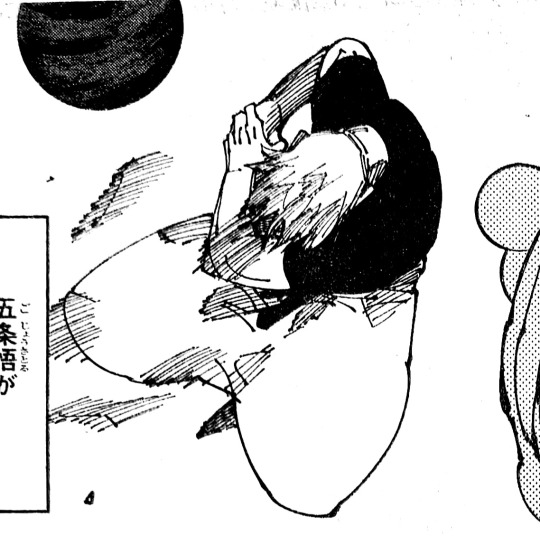


like sensei, like student
#i like how quickly my mind saw this#just having a little fun with this chapter#jjk#jujutsu kaisen#gojo satoru#itadori yuji#jjk 235#jjk leaks#jjk spoilers
776 notes
·
View notes
Text
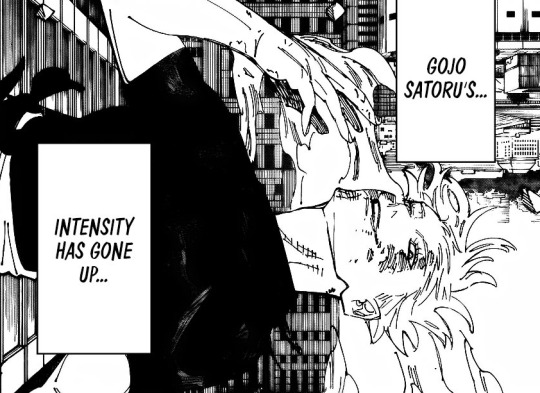
he's serving cunt & he knows it
527 notes
·
View notes
Text

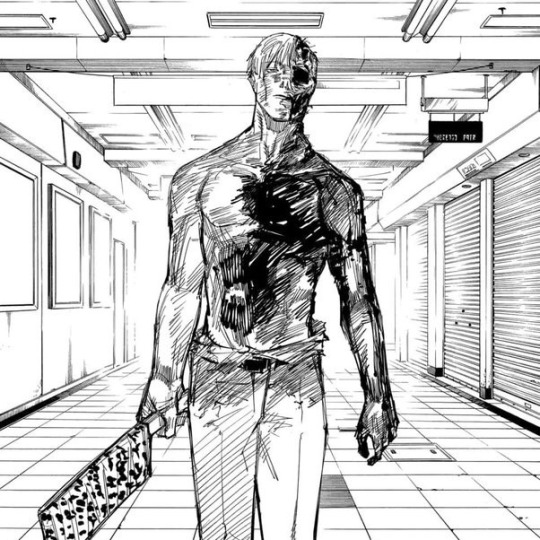
Gojo 🤝 Nanami : casting 4 black flashes on the same day + having the left side of your body burnt off then dying
honestly it shouldn’t come as a surprise that Yuuji is so good at using black flashes #like father like son (sorry Todo but it runs in the family)
#jjk manga spoilers#jjk 235#jujutsu kaisen#gojo satoru#nanami kento#yuuji itadori#black flash#nanago#nanami kento x gojo satoru#nanami x gojo#husbands#me and my nanago agenda#as i was reading the panel i immediately saw the parallels
574 notes
·
View notes
Text
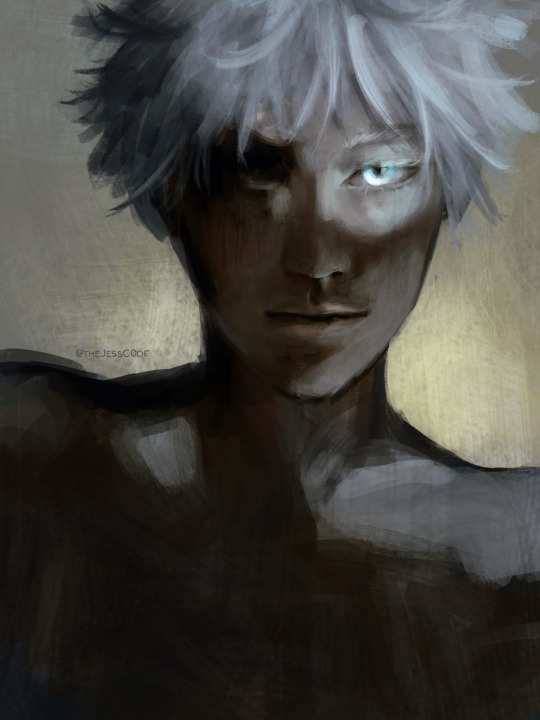
the winner
#jjk 235#gojo jjk#gojo fanart#satoru gojo#jjk gojo#jjk satoru#jjk#jjk fanart#digital art#jujutsu kaisen fanart#jujutsu kaisen#jjk art#fanart#artist on tumblr#art
471 notes
·
View notes
Text
jjk 235 spoiler
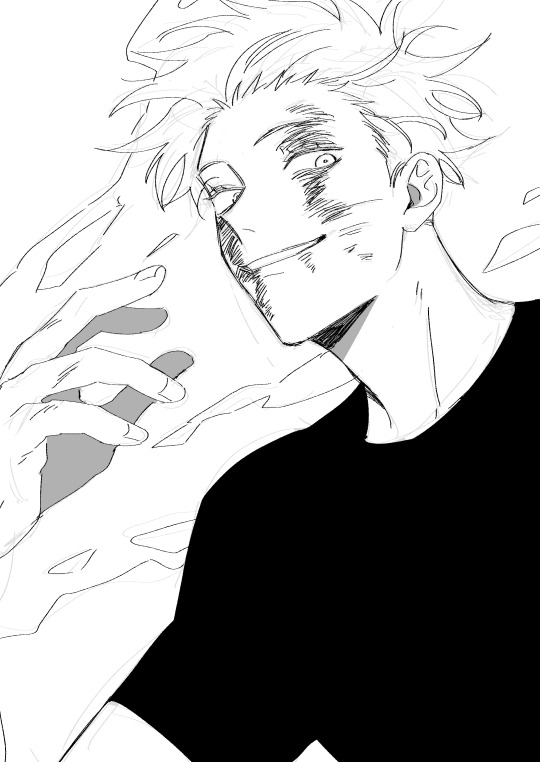
364 notes
·
View notes
Text
he lived, so did the shirt

246 notes
·
View notes
Text
There’s so much I could analyze about the current state of JJK. Like the way it used to have a real plot and now it’s just a male power fantasy like every other battle shonen. The way Yuuji isn’t even the protagonist anymore. The way Akutami has and is mistreating all the women when, in the beginning, it seemed like there would be meaningful commentary on the in-universe misogyny. The way the worldbuilding is so convoluted now that I just skip over the long-winded exposition because I know It won’t make sense to me. The way the systemic issues aren’t even a driving part of the story anymore. The way we haven’t seen Nobara (one of our main characters!) in over 100 chapters. The way this fight between Gojo and Sukuna feels ridiculous with the rest of the cast standing around watching them without being involved. The w
350 notes
·
View notes
Text
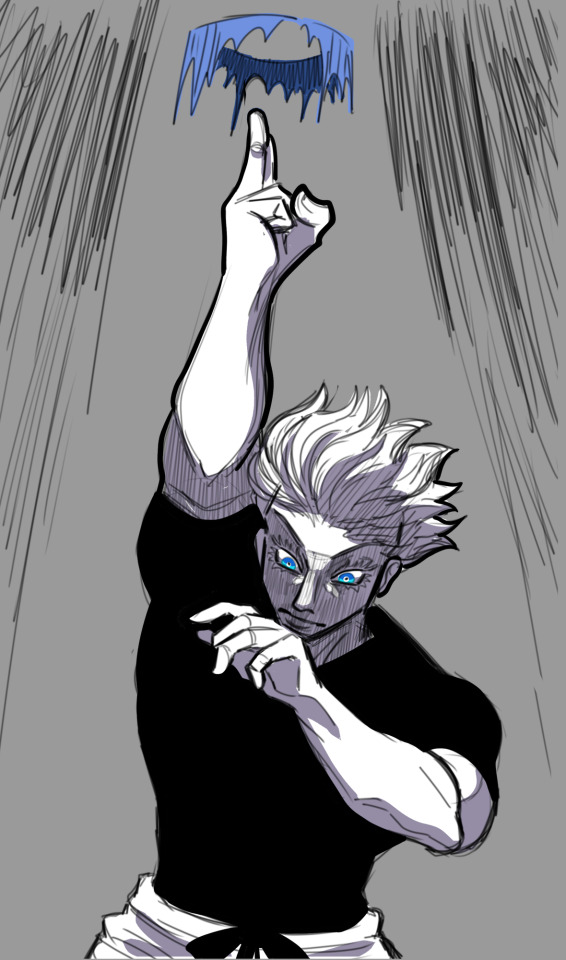

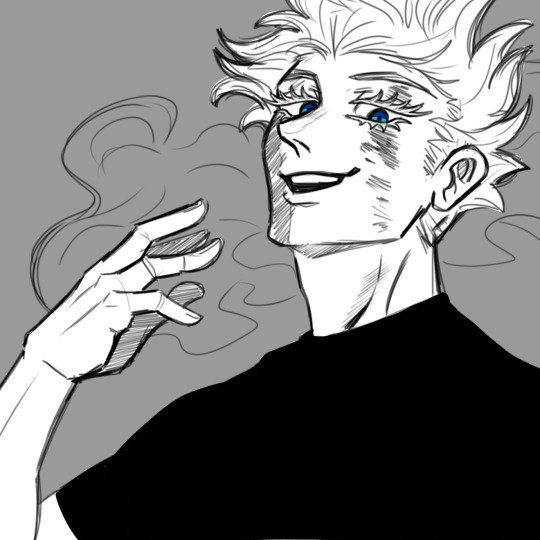
Gojo redraws of the latest leaks becauSE HOO BOY-
#jjk#gojo satoru#satoru gojo#jjk gojo#ryomen sukuna#sukuna ryomen#jujutsu kaisen#jjk manga leaks#jjk spoilers#jjk 235#my art#sketches#digital art#jjk fanart#fanart#anime#manga
227 notes
·
View notes
Text
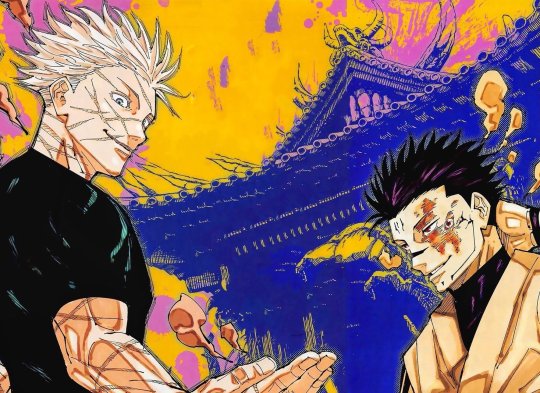
Gonna lose?! It’s Gojō Satoru!!
Karma and consequence in Jujutsu Kaisen
With the release of chapter 235 of Jujutsu Kaisen, the King of Curses has been defeated and Gojō Satoru has cemented his title as the 'Strongest’. The war isn’t over yet, but the battle is won, and I think the outcome of this fight is by far the most interesting for both characters.
Truthfully, at the start of the Shinjuku Showdown arc, I wasn’t particularly rooting for Gojō or Sukuna to win. However, as the fight developed (alongside the release of the anime adaptation of Hidden Inventory/Premature Death), I found myself becoming more and more invested in Gojō Satoru as a character and, consequently, theorising about what a ‘satisfying conclusion’ to his story might look like.
Shortly after the release of chapter 232, I saw an interesting post suggesting that ‘gain and loss’ is the theme of the Gojō vs Sukuna fight. Of course, ‘Gain and Loss’ is the title of chapter 221 when Gojō finally gets out of the Prison Realm only to learn that Sukuna has taken over Megumi’s body. I’d like to go a step further and suggest that ‘gain and loss’ — and by extension, karma and consequence — is actually a key theme of Gojō’s character (and maybe even Jujutsu Kaisen on the whole).
For full disclosure, I wrote about 90% of this before chapter 235 was released, operating on the belief that Gojō would eventually win this fight. It is a long post, so buckle up and let’s get into it!
Gain and loss in Jujutsu Kaisen
The idea of gain through loss was developed very early on in Jujutsu Kaisen with the introduction of binding vows. From Nanami’s ‘overtime’ to Sukuna's open barrier domain, a self-imposed binding vow offers a sorcerer an advantage in combat in return for an increased level of risk. In other words, sorcerers can ‘gain’ strength in exchange for a ‘loss’ of security. When it comes to binding vows, the bigger the risk the bigger the reward.
The idea of gain through loss was further developed through the introduction of Heavenly Restriction. Similar to a binding vow, a person with a Heavenly Restriction is ‘gifted’ with enhanced abilities in one area in exchange for limitations in another. However, unlike a binding vow, Heavenly Restriction exists from birth (although it remains unclear whether it occurs due to mere chance).
There are numerous powerful examples of both binding vows and Heavenly Restriction throughout the series. For Gege Akutami, they are key to maintaining a balanced power system where intelligence and tactical thinking can lead an underdog to prevail in the face of a more powerful opponent — think Yūta beating Getō or Toji beating Gojō. Through these mechanics, we can deduce that understanding gain and loss, give and take, risk and reward — however you want to put it — is crucial to mastery of jujutsu sorcery.
Naturally, if gain and loss are embedded in the laws of the Jujutsu Kaisen universe, it makes sense that the theme exerts a heavy influence over the narrative, too. Of course, consequences are an important way to create compelling characters in any story, but this rings especially true for Jujutsu Kaisen which draws deeply on Buddhist themes and traditions.
In Buddhism, karma is not a deterministic system of retribution, but the natural law of cause and effect. It is directly referenced in Jujutsu Kaisen when Fushiguro Megumi explains his personal ideology using ‘因果’, a Japanese Buddhist term meaning ‘karma’ or ‘fate’ which can be more literally translated as ‘cause and effect’. The second kanji means ‘fruit’, hinting at the underlying agricultural metaphor behind karma in Buddhism: plant a seed, later receive a harvest — or, to use a saying derived from another religion with an important role in Jujutsu Kaisen, ‘you reap what you sow’.
However, an important characteristic of karma which is commonly misunderstood is that the relationship between a cause and its effect is not necessarily linear, but rather part of an intricate network that spans past, present, and future. In other words, the ‘consequences’ of one’s actions might arrive much later.
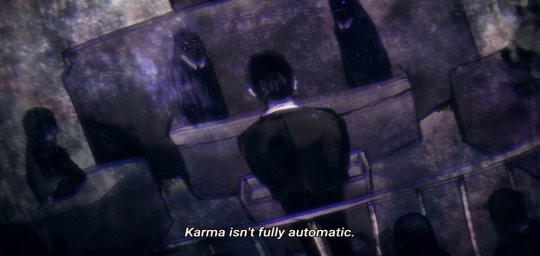
This can lead to mistaking the effect of one cause for the effect of another, creating a reality where ‘bad’ things happen to ‘good’ people and vice versa. The resulting circumstances may make it easier to do ‘bad’ deeds but, importantly, the freedom always remains to choose the path of ‘good’.
Thus emerges a system where liberation from suffering (in Buddhism, the endless cycle of rebirth known as samsara) is not determined by the judgement of some higher power, but by an individual’s continued choice to do ‘good’. In other words, you can create your own destiny, but only if you understand karma.
The beginningless karmic cycle is rooted in actions performed in ignorance. Therefore, breaking free of it — enlightenment — can only be achieved through knowledge.
Gojō Satoru: the embodiment of enlightenment
As a character, Gojō Satoru is symbolically tied to these concepts. We’re told that his birth altered the balance of the world, causing curses to grow stronger in response to the sudden injection of power into the ecosystem. However, while Gojō’s birth might be the cause of the imbalance, his very existence is itself the effect of something else.

Supposedly, the Star Plasma Vessel, the Six Eyes, and Tengen are all connected by fate. However, the term that Tengen uses — ‘因果’ — is the same one that Megumi uses for ‘karma’, suggesting a cause and effect relationship. This is confirmed when Tengen implies that the Star Plasma Vessel and the Six Eyes always appear in response to the merger — the irrepressible effect to the merger’s cause.
Kenjaku cannot contend with the immense strength of the Six Eyes nor the universal law of cause and effect. However, Fushiguro Toji, who possesses no cursed energy due to his Heavenly Restriction, is not bound by fate and is thus able to interrupt a cycle of cause and effect which has existed for at least a thousand years.
Tengen actually suggests that karma (因果) and cursed energy are one and the same so — if we take Tengen’s words at face value — Toji is an anomaly who is free from its bindings.*
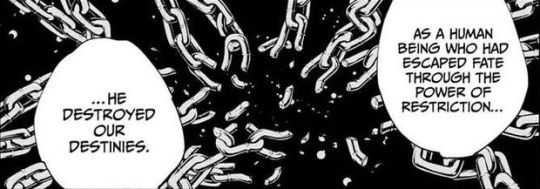
However, the characters whose lives he touches are not. Toji sets another chain of cause and effect into action when the events of Hidden Inventory lead to Gojō’s ascension to 'the Strongest'.
There is much debate in the fandom about whether Gojō’s moment of ‘enlightenment’ is legitimate, especially in light of his fight with Sukuna — the only other character associated with the phrase supposedly uttered by Buddha Shakyamuni at birth.
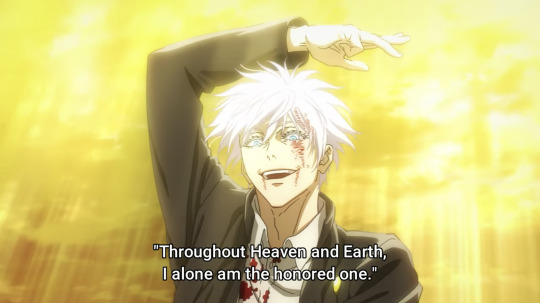
However, if enlightenment is understanding of reality that transcends conceptual thought, then Gojō Satoru is its physical embodiment in Jujutsu Kaisen.
His given name, Satoru (悟), is a verb meaning ‘to know’ or ‘to understand’, and the root of the Japanese Buddhist term for ‘enlightenment’. His innate domain — a representation of one’s innermost self — is a flood of infinite knowledge that constitutes the ‘truth’ of the universe. His Six Eyes are reminiscent of the all-seeing Eyes of Buddha or the Six Transcendental Powers or the Five Eyes — or perhaps all three!
Gojō is steeped in symbolism not only relating to Buddhist enlightenment, but to the founding Buddha himself, right down to his world-altering birth — the divine event which sets the modern-day story in motion.
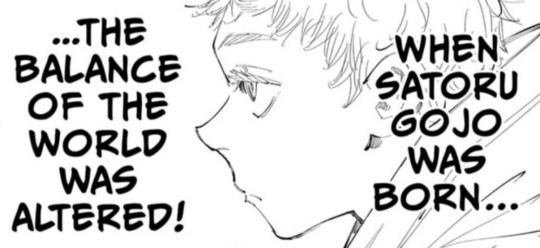
Although he may have spoken Buddha Shakyamuni’s words in a moment of euphoria, the suggestion Gojō had reached a higher state of being was never intended to be called into doubt. The pertinent question, instead, is why the unimaginable strength that accompanies his ascension to almost godlike status seems to bring Gojō more loss than gain — especially when, in a twist of irony, he was only able to gain that strength through loss.
‘The Strongest’ : an allegory for enlightenment
As the two strongest sorcerers battled it out in Shinjuku, the question on everyone’s lips during the weekly chapter discussions was, ‘Who will win?’ However, Jujutsu Kaisen has already established that ‘winner’ is not necessarily always interchangeable with ‘strongest’. Perhaps that’s why, in the aftermath of the fight, the discussion has turned to arguments about which character is the strongest instead — from cursed technique to battle IQ.
Even now, we don’t know much about Sukuna’s abilities nor his character, so it’s always been difficult to accurately judge his strength against Gojō’s. However, a surprising number of people went into this fight believing that Sukuna would win without much trouble.
Some made the reasonable argument that ‘the strongest sorcerer in history’ using the Ten Shadows technique while inhabiting the body of his dearest student presented a no-win situation for Gojō. Others made the much less reasonable argument that Gojō’s claims about his strength were little more than arrogance born from a cushy life in an era of ‘weak’ sorcerers.
Indeed, Sukuna himself echoes that sentiment in chapter 230, going as far as to call Gojō ‘unenlightened’ (凡夫) — before being immediately humbled.
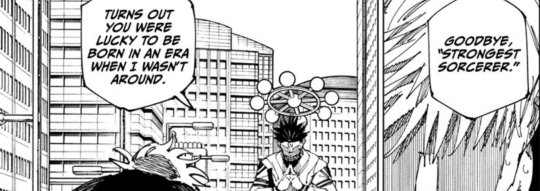
This isn’t the first time that Gege Akutami has directly challenged readers’ assumptions through his characters. However, Gojō in particular lends himself to reader speculation, because Akutami deliberately makes it difficult to know the character by maintaining a narrative distance from him that mirrors his Limitless technique.
This leads to a wonderful phenomenon where the reader falls into the same trap as the characters in the series by assuming that, while other sorcerers are struggling dreadfully, Gojō is having an easy time of things — because that’s what it looks like most of the time. Nanami might be right when he suggests that Gojō could take care of everything by himself. However, just because he could do it, does that mean he should?
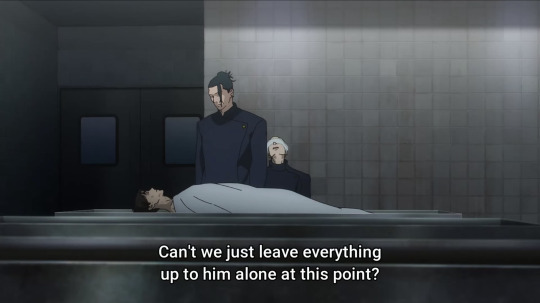
The problem is, with Gojō kept at a distance, it’s easy to forget how he became 'the Strongest’ in the first place. It’s true that, even before he becomes a fully realised Six Eyes user, Gojō’s abilities dwarfed those of any other living sorcerer. For people like Getō and Megumi whose techniques require a very steep learning curve to master, I can imagine that it feels like Gojō’s unimaginable strength was handed to him on a silver platter at times.
However, both things can be true: Gojō was born with innate strength that most sorcerers can only dream of and Gojō is an exceptional talent in his own right.
We all saw the suffering and sacrifice that Gojō went through on his path to becoming a sorcerer strong enough to face the King of Curses. In a series where the primary power source is born from negative emotions, perhaps it makes sense that tragedy promotes strength. Yet, Getō — whose technique is the epitome of strength through negative emotions — experienced the same tragedy as Gojō. So why did they head in opposite directions after the events of Hidden Inventory?
If Gojō is the embodiment of enlightenment in Jujutsu Kaisen, then Getō is his opposite. Where Gojō achieves understanding, Getō is blinded by ignorance which shackles him to a cycle of suffering — the marathon game of jujutsu sorcery.
In blaming non-sorcerers’ inability to regulate cursed energy — rather than the negative emotions that generate cursed energy in the first place — Getō mistakes one cause for another. Following the natural law of cause and effect that is karma, the solution should lie in shedding negative emotions altogether — just like Gojō at the moment of enlightenment.

Sadly, in his quest to find liberation from suffering, Getō actually condemns himself to it. Where Gojō chooses to let go of hatred and anger, Getō chooses to cling to them. This is ultimately why 'the Strongest’ changes from plural to singular. However, all of this assumes that Gojō did things the ‘right’ way when it’s very possible that Gege Akutami actually seeks to criticise a religious doctrine that separates the ‘honoured’ ones from everyone else.
Getō’s response to the horrors he endured evokes sympathy because it feels fundamentally human. In contrast, enlightenment seems so unattainable to the average human being that it becomes almost inhuman — the reserve of gods.
Indeed, Gojō is often accused of having a ‘god complex’, and Gege Akutami’s continued references to the divine don’t do anything to help. However, the series more often paints its strongest characters as closer to weapons of mass destruction or natural disasters, making the reality of ‘the Strongest’ less like reverence and more like dehumanisation.
Although Gojō achieved ‘enlightenment’, he’s ultimately still a human being — something that’s easy to forget. In fact, one of my favourite things about Gojō’s character is how he exists on an almost metatextual level. Too often, characters and readers view Gojō Satoru as 'the Strongest’ first and a human being second — a notion embodied by this notorious panel.
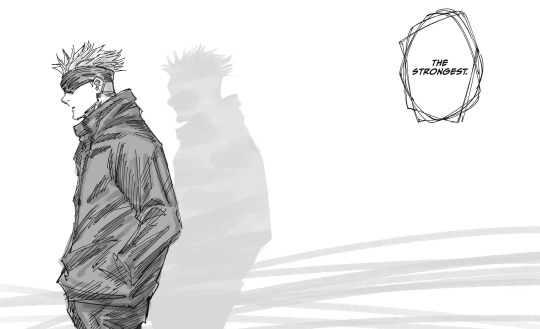
Thus, rather than having a ‘god complex’, I interpret Gojō as a character who struggles with his place in the world. His strength is what keeps him at a distance from the people around him — from the literal distance maintained by his technique to the metaphorical distance that separates him from the ‘unenlightened’.
Even the blindfold he wears to avoid discomfort hides his eyes, shutting off the ‘window to the soul’ and making him a less approachable figure. Thus, the thing that makes Gojō more comfortable around other human beings is ironically the thing that makes others less comfortable around him.
With the power at his disposal, Gojō is frightening at times, and Gege Akutami goes to great pains to show us the brutal potential of such strength — for example, in Shibuya when he ruthlessly dismantles 1000 transfigured humans with the precision of a machine in less than five minutes.
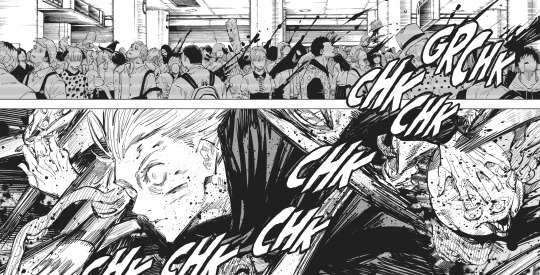
However, this display of violence comes off the back of Gojō’s most compassionate moment in which he bends the laws of jujutsu sorcery to preserve as many human lives as possible. Each time the curses attempt to force his hand, he does the inconceivable, even going so far as to limit his own strength by fighting without his technique to avoid collateral damage to humans caught up in the chaos.
Importantly, he doesn’t agonise over his decisions like the curses expect. Instead, when presented with a choice between two options that fundamentally violate his ideals, he forces another path without thinking. This is Gojō’s ‘overwhelming sense of self’. His commitment to upholding the ‘meaning’ he inherited from Getō is so unshakeable that it’s instinctive; so engrained that it’s unconscious.
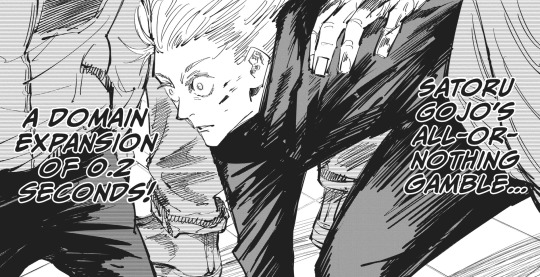
Despite his inhuman strength, Gojō’s actions in Shibuya exemplify his firm stance on the side of ordinary human beings. From his technique to his blindfold, he removes the physical barriers that separate him from the rest of humanity. The result is that, although his display of power in Shibuya is godlike, Gojō never seems more human.
Of course, it’s his humanity that ultimately makes him vulnerable to the Prison Realm, and many suggested that this ’weakness’ is why he would lose to Sukuna — a character who has wholly relinquished his humanity.
Humanity in opposition to strength
The unexpected appearance of his ‘best friend’ in Shibuya causes Gojō to falter for a heartbeat, but it’s long enough to make his brilliance look like foolishness in hindsight. His decision to save innocent people at B5F ultimately leads to the deaths of many thousands more over the course of October 31st and the following Culling Game. Among the casualties of the chaos are some of Gojō’s friends, colleagues, and students — as well as the Fushiguro siblings who were under Gojō’s personal care.
Of the Hidden Inventory arc, Nakamura Yūichi, Gojō’s voice actor said:
‘Even though Gojō had power, he failed his mission, he failed to protect Amanai, and he lost his best friend. He lost everything, and the only thing he succeeded at was awakening his abilities.’
So, it certainly seems true that Gojō’s choice to hold onto his humanity has brought him more losses than wins. In fact, at this point in the story, can we honestly say that Gojō has ever truly ‘won’?
Despite this, the characters in the series never stop thinking of Gojō as ‘the Strongest’. The narrative doesn’t ridicule him for his sentimentality in Shibuya, because it’s perfectly reasonable in the face of Kenjaku’s mind-boggling scheme. Even Sukuna recognises Gojō’s strength in the immediate aftermath of the event.
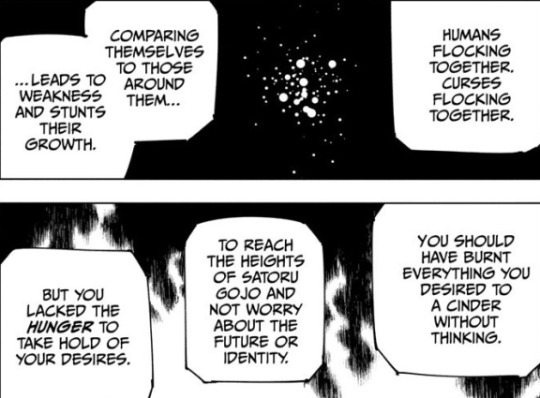
Aside from Kenjaku themselves — who has never suggested that Gojō is anything but immensely powerful — no one has ever criticised Gojō for his humanity. In fact, even prior to the Shinjuku Showdown arc, I’m not convinced that humanity is ever reliably situated in opposition to strength in Jujutsu Kaisen.
Many point to Uro Takako’s conversation with Okkotsu Yūta as evidence that tossing out one’s humanity is the only way to achieve ultimate strength. However, putting aside the fact that the translation warps Uro’s meaning somewhat, it’s unwise to assume that Sukuna’s is the only way to reach that level, simply because he’s the only example in history of a sorcerer with comparable strength to Gojō.
This is even more true when you take into consideration that everything about the context surrounding Uro’s assertion suggests otherwise. After all, this prideful, vicious sorcerer has just been beaten by a teenage boy who fights solely to protect the people he cares about.
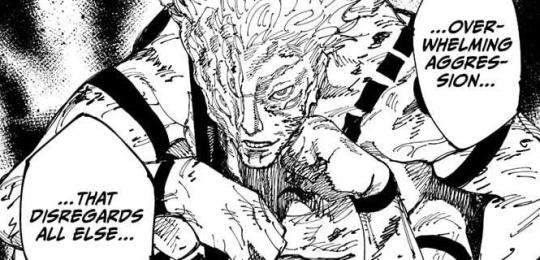
‘Overwhelming sense of self’ — the more accurate translation of the above panel — is about having absolute conviction in who you are as a person. The quality of your ideals is irrelevant as long as your commitment to them surpasses all else, and this has never been Gojō’s issue.
To say that Gojō’s humanity makes him weak misses the point, because it’s never been a question of strength. There’s no need to invent a weakness in the form of his humanity, because we already know his weakness — he told us himself.

Perhaps this starts to get at the the truth of ’the Strongest’ and the solitude that comes with ultimate strength. In Gojō’s own words, ‘When granted everything, you can't do anything.’ Despite being strong, he simply cannot save everyone. So, if being ‘the Strongest’ doesn’t help Gojō towards his goals, then what’s the point in his strength?
Of course, this is why Getō’s parting words hit Gojō so hard. When the boy who taught him that ‘protecting the weak’ is important tells Gojō that he has the power to commit the biggest act of genocide in history, the title of 'the Strongest’ is transformed from a blessing into a curse. I can’t imagine that Gojō ever feels more powerless than when he realises that he’s trying to save people using a body that’s built to destroy — a contradiction that’s illustrated to us in our first introduction (chronologically) to Gojō as a character.

If that wasn’t enough to cause an existential crisis for Gojō, Getō’s follow-up question guarantees it. In challenging Gojō’s assertion that Getō’s goals are impossible to achieve, Getō simultaneously questions Gojō’s identity beyond ‘the Strongest’, unintentionally (or perhaps intentionally) dehumanising Gojō by reducing him to his strength. This is especially painful coming from Getō of all people.
By the end of the conversation, Gojō’s entire worldview has been called into question by the person he trusted most. Getō, who always impressed upon Gojō the importance of meaning, leaves Gojō searching for the meaning in his strength — and, over 200 chapters after Getō asked the question, the answer still isn’t clear. This, I believe, is where the Shinjuku Showdown arc comes into play.
A reason to fight
From a narrative point of view, Getō isn’t entirely wrong to insinuate that Gojō lacks an identity beyond ‘the Strongest’. His primary role in the story has always been to act as a power ceiling from which the reader can extrapolate information about Gege Akutami’s world and its mechanics. Even his absence from the story is meticulously set up to illustrate the anarchy that breaks out due to the power vacuum he leaves behind.
Prior to the Shibuya Incident, Gojō Satoru’s overwhelming strength presented an obstacle to other characters’ growth. In order to create a more balanced playing field and an opportunity to explore creative techniques and fights on a previously unseen scale, it’s understandable that Akutami needed to get Gojō out of the way — at least until Sukuna could join the story as a fixed member of the cast.
As expected, even the strongest sorcerers we encountered during the Culling Game pale in comparison to the prowess on display during the Shinjuku Showdown. It all serves to show that Gojō and Sukuna are on an entirely different level — to the point that, even after Gojō burns out the part of his brain responsible for his domain, his strength still doesn’t dip below that of Okkotsu Yūta and Hakari Kinji.

To paraphrase Megumi, I shouldn’t try to find logic in a powerscaler’s behavioural patterns, but I can’t deny it’s immensely frustrating that week after week fans get caught up in arguments about who is the better sorcerer when it’s the least interesting thing about this fight.
The only reason ’the Strongest’ even existed as a neatly defined category up until this point was because of the lack of any viable opponent for Gojō. Now that he’s fighting someone on his level, comparing these two behemoths of jujutsu sorcery is the same as any other powerscaling exercise: reductive, vulnerable to bias, and ultimately missing the point.
Gege Akutami has never written a fight simply for the fun of seeing two characters go at it. There’s been a greater purpose behind every carefully created match-up in the series, either in the form of high stakes or an important lesson for the characters involved — or sometimes both.
While Akutami clearly enjoyed writing this back and forth between two masters of their craft, carefully balancing the scales to ensure that neither gained the upper-hand for too long, there is a great deal of character development staked on the outcome of this fight.
There are parallels between Gojō and Sukuna as characters but, more than anything, the Shinjuku Showdown arc has exposed some fundamental differences between the two — namely, why they fight in the first place. While it’s true that Gojō is fighting Sukuna partly because there’s no one else who can, it’s also true that the stakes have never been higher for Gojō. He has a lot to gain and a whole lot more to lose, so his reason for fighting feels tangible to the reader.
Conversely, Sukuna’s reason for fighting is considerably less clear. While we don’t know the nature of Sukuna’s binding vow with Kenjaku — or anything about his motivations in general — it doesn’t seem like there’s much at stake for Sukuna except for, perhaps, his pride. Beyond advancing the plot, this poses a lot of interesting questions about what Sukuna would have to gain from winning this fight.
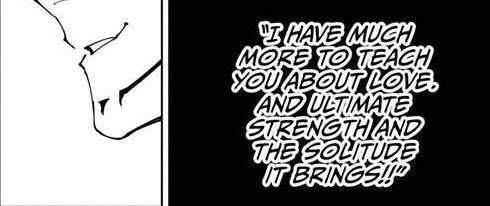
Since Gojō’s return, Sukuna has recalled Yorozu’s words about love multiple times. Their purpose — and Sukuna’s initial reaction to them — are still shrouded in mystery. However, through Gojō, we can learn something about ‘love’ and how it relates to the ‘the solitude of ultimate strength’.
Gojō never wanted to be ‘the Strongest’ alone. In fact, his entire motivation as a character is raising up ‘strong and intelligent allies’, constantly chasing the companionship he felt as one half of the strongest duo and trying to ensure that his students never feel the same isolation that’s plagued him and Getō before him.
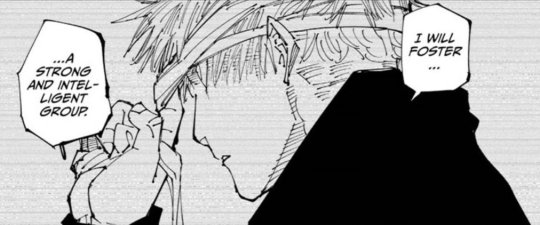
In the recent chapters of the manga, Gege Akutami has made it clear that Gojō isn’t really alone at all — Shōko reminiscing on their friendship in chapter 220; Gojō’s comrades rallying around him during the send off in chapter 222; the wonderful ‘my students are watching’ callback in chapter 230.
What’s more, for the first time in his adult life, we see Gojō — who’s famously in his element when he’s alone — start a fight with people at his side, leaning on three characters who we’ve previously been led to believe he looked down on.
The distance that’s always existed between Gojō and the people around him is closing. He has removed his mask and he is open to the world — the blindfold is gone; the shapeless, oversized jacket is gone; Gojō even removes his technique to let people in during his sendoff. Akutami makes it explicitly clear that Gojō’s allies have got his back, and he’s got theirs in turn — they’re his reason for fighting.

On the other hand, his opponent only has a single ally in all the world and, although Uraume is a devoted servant, there is no suggestion that they would tag in when the going gets tough. Sukuna has already told us that, for him, losing and dying are the same thing — a curious contrast to Gojō who does not put ‘winning’ and ‘dying’ in opposition, and this creates an interesting situation where both fighters could ‘win’ by their standards.
If Gojō saves the people he cares about (and the world at large) but dies in the process, he wins. Equally, if Sukuna is the sole survivor of the fight, he wins — but what would that actually mean for him?
One approach embodies overwhelming selfishness, the other embodies overwhelming selflessness, but only one of these approaches has been established as the most powerful form of binding vow in Jujutsu Kaisen. With all that said, many people believed that Gojō dying to win was the most likely conclusion to the fight — but that’s what a small fry would think!
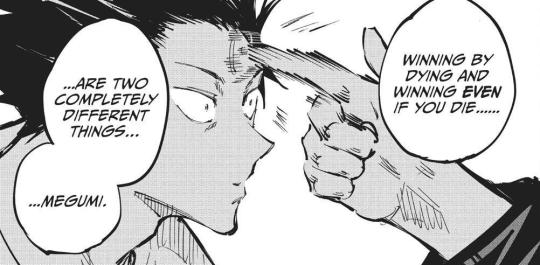
In Jujutsu Kaisen, it has always come down to one question: how much are you willing to risk — not sacrifice — in order to win? This is the lesson that Gojō impresses upon Megumi, and it’s why I was always in the camp that believed Gojō would win and survive. I didn’t expect his victory to be quite so clear cut, but it seems obvious in hindsight — and it’s all thanks to the power of love and friendship.
In chapter 234, Kusakabe suggests that Sukuna is keeping something in reserve, because he knows that if Gojō loses, he’ll immediately have to fight a number of other powerful sorcerers. Gojō knows that there are strong allies ready to back him up if he fails, so he can go all out.
Meanwhile, Sukuna is truly alone — to the point that he has to create allies in the form of shikigami in order to contend with Gojō. In the end, the explanation for Gojō’s victory is simple. Where Gojō gave it his best, Sukuna didn’t — and that was a grave underestimation of his opponent for which he paid the price.
So, the Shinjuku Showdown arc has come to an end and Gojō has reaffirmed that he is, in fact, 'the Strongest'. However, his story isn’t over yet, so what would a satisfying conclusion to his character arc look like?
Are you Gojō Satoru because you’re the Strongest?
Although Itadori Yūji is the main character of the series, Gojō Satoru is foundational to the story — despite how much Gege Akutami jokes about hating him. Gojō’s story is the thread that ties the series together, so landing the ending is crucial for completing not only Gojō’s character arc, but also that of many other characters. For Gojō, everything consistently comes back to Getō Suguru and Fushiguro Toji, but there remain unanswered questions regarding both.
Toji’s presence during the clash of the strongest sorcerers is too large to ignore. Aside from the allusions to Toji himself, his son plays a pivotal role in Gojō’s story as the human representation of gain through loss — the blessing born from Gojō’s curse. Taking Megumi under his wing marked Gojō’s first step towards a brighter future after the tragedy brought on by the failed Star Plasma Vessel mission, but there’s one major plot thread left unresolved.
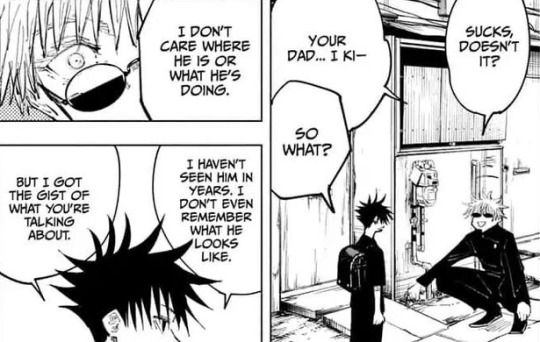
I wouldn’t have thought that Megumi learning the truth about his father was important after he dismisses Gojō’s attempt to tell him during the Hidden Inventory arc. However, the combination of Megumi’s interaction with Toji in Shibuya, his visible cluelessness when Tengen mentions Toji, and the numerous ways Gojō references Toji during the Shinjuku Showdown arc has convinced me that Akutami plans to follow this up at some point.
Right now, Megumi’s fate is still hanging in the balance. Although many people are waiting for something terrible to befall Gojō — losing his Six Eyes; burning out his technique permanently; dying — I’d like to believe that, if we look at Jujutsu Kaisen through a karmic lens, Gojō isn’t owed any more losses. At the very least, he certainly doesn’t have to die to progress the story as some people have suggested.
Our heroes, including Gojō himself, have been on a major losing streak for a long time now. Gojō being freed from the Prison Realm represented a shining beacon of hope at the lowest point in the series. To extinguish that light by killing Gojō almost immediately after he’s returned to the story would be another major blow to the characters and the readers.
I wouldn’t put it past Akutami to send some more pain our way before the end of the story, but if Gojō is going to die on December 24, I don’t think it’s before a number of other things happen.
If Gojō inherited Getō’s ideals in a symbolic ‘passing of the torch’, then his death before he has confirmed the safety of the people who depend on him is a depressing end to his best friend’s legacy. Additionally, up until now, Gojō has never had the opportunity to answer Getō’s question once and for all.
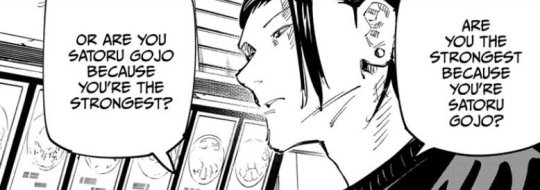
I would argue that Gojō has proven multiple times during the fight against Sukuna that he’s 'the Strongest' because he’s Gojō Satoru, but is he Gojō Satoru because he’s the strongest? He can’t discover that unless he experiences what it’s like not to be 'the Strongest' — either by losing his strength or by sharing the burden with the strong and intelligent allies he’s been raising for the entirety of his adult life.
Of course, there’s one more glaring thread to tie up, and it might be the most important of all when it comes to the completion of Gojō’s character arc. His first thought when he bursts out of the Prison Realm is a desire to lay Getō’s body to rest — a desire to rectify the mistake which threw the entire world into chaos.
As we’ve already discussed, despite his strength, Gojō has racked up a collection of costly failures. Thus, his entire character arc is about learning from the mistakes of his past. He’s taken every cruel loss that the universe has sent his way and, instead of lashing out with all that power at his disposal, he has grown from his experiences and chosen the path of ‘good’ time and time again.
If Gojō dies before retrieving Getō’s body from Kenjaku’s clutches, he has failed his best friend at the very last hurdle, and this would be a truly bleak way to end his story.
Concluding thoughts
At the conclusion of the Shinjuku Showdown arc, I’d like to see Gojō Satoru step back from the fight after inspiring hope in his students by delivering a final lesson in the form of his win. It is impossible to predict what Gege Akutami will do next, but I would like to see the reins handed back to the students for a while, as I feel Gojō has played his part against the King of Curses.
It is Sukuna, not Gojō, who presents the most interesting possibilities for character development after the conclusion of this fight. I am genuinely excited to see how he grapples with this loss that has the potential to challenge his entire view of himself and others. He disrespected Yorozu and treated his fight against her as a ‘test drive’, and thought he could get away with treating Gojō the same way. I think Ryōmen Sukuna might be about to learn some important lessons, and I would love to see him in conversation with Gojō before the latter bows out of the story.
Of course, we can always trust Gege Akutami to surprise us, and it’s entirely possible that the story will veer in a completely different direction than I expected. However, I have faith that he will deliver something profound, no matter what lies ahead.
---
*This is a very interesting concept in and of itself, especially in relation to the goal of the Culling Game, Yuki and Kenjaku’s battle of ideals (i.e. ‘breaking free from’ versus ‘optimising’ cursed energy), Maki’s ‘enlightenment’ in the Sakurajima colony, and the understanding that true enlightenment lies in breaking free from all karma — both good and bad. After all, golden shackles are still shackles. Perhaps I’ll write about this another time.
#jujutsu kaisen#jjk#jjk 235#呪術廻戦#jjk meta#jjk analysis#jujutsu kaisen meta#jujutsu kaisen analysis#jjk spoilers#jjk manga spoilers#jujutsu kaisen spoilers#gojo satoru#sukuna#ryomen sukuna#fushiguro toji#fushiguro megumi#geto suguru#kenjaku#can you see why this took so long???#it's almost 6000 words 💀#and maybe it's all bullshit haha!!#but i'll hate myself if i wasted all that time for nothing#so enjoy i guess!!#my writing#fushiglow
203 notes
·
View notes
Text

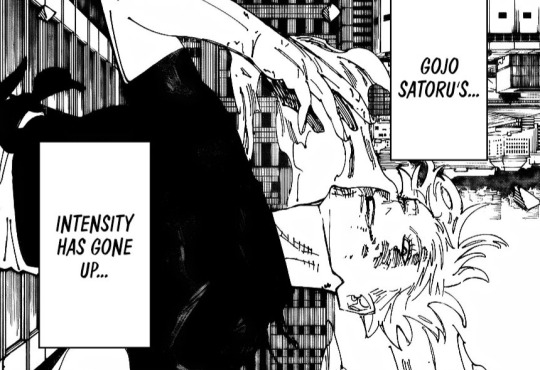

holy trinity of gojo panels
#a masterpiece ... i just dont have anything else to say#jjk 235#jjk leaks#jjk spoilers#gojo satoru#gojo#jjk#bakma bana
349 notes
·
View notes
Text

248 notes
·
View notes
Text

327 notes
·
View notes
Text
GEGE. WHEN I CATCH YOU GEGE. GEGE WHEN I CATCH YOU GEGE WHEN I CATCH YOU
#NEVER.#NEVER EVER.#PLAY WITH MY FEELINGS LIKE THAT AGAIN.#MY HEART DROPPED WHEN XUE MESSAGED ME ABT IT I ALMOST DIED#✧ ˚ · . soph rambles#jjk 235#jjk spoilers
168 notes
·
View notes
Text
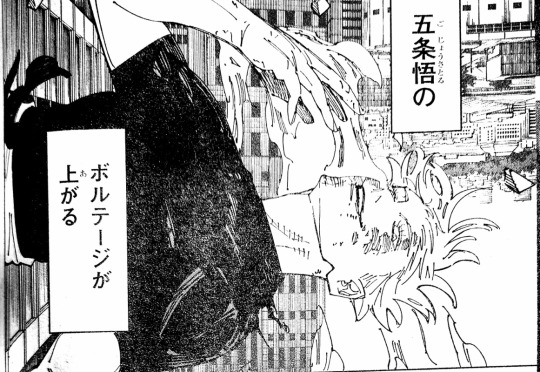
OUTTOF MY WAYYY!!!!
173 notes
·
View notes